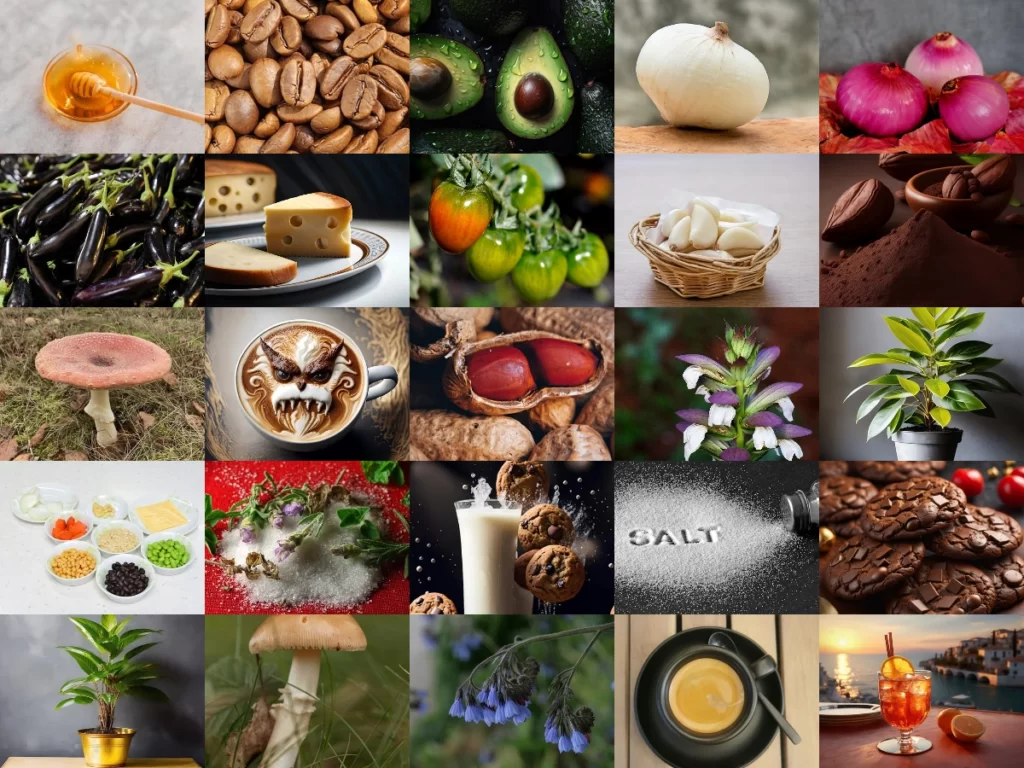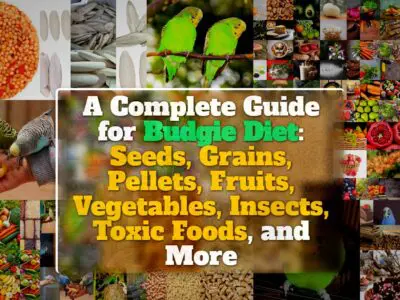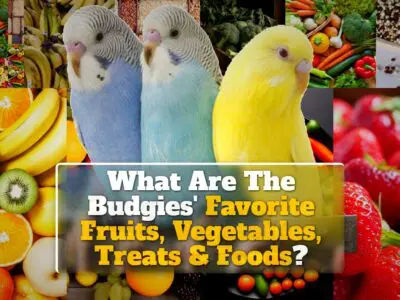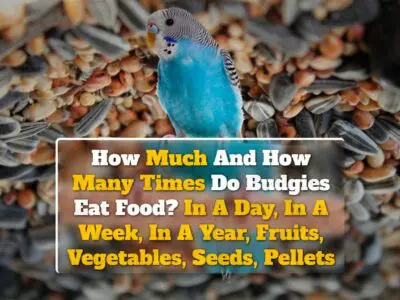Budgies should avoid certain fruits, vegetables, human foods, and houseplants, as they can be toxic or harmful.
This includes avocados, fruit pits, high-fat and high-sodium foods, alcohol, chocolate, raw meats, spicy foods, dairy, and certain houseplants like dieffenbachia and philodendron.
It’s crucial to ensure a budgie’s diet is safe and nutritious.
As an avid bird enthusiast, having been a former budgie owner, I’m well aware of the various dietary challenges these charming, feathery friends face.
Drawing upon my experiences, extensive readings, and observations from related materials, I decided to compile a list of harmful foods for budgies.
Understanding this list is essential not just for current budgie owners, but also for those who plan to welcome these fascinating creatures into their homes.
This comprehensive guide will cover 35 toxic foods, including fruits, vegetables, and human foods that are detrimental to a budgie’s health.

Chocolate
Just like with dogs, chocolate is extremely toxic to budgies.
It contains theobromine, a substance that budgies cannot metabolize.
Ingestion can lead to vomiting, diarrhea, rapid breathing, seizures, and in severe cases, even death.
Always ensure chocolate and products containing it are kept well out of your budgie’s reach.
A recent case study (archived) detailed how a budgie experienced severe symptom after consuming a small amount of chocolate and cacao-covered sugar.
The four-month-old male budgie exhibited hyperactivity, tremors, ataxia, loss of appetite, vomiting, and diarrhea.
Clinical examination found an elevated body temperature and increased respiratory and pulse rate, indicating severe distress.
The toxic components in chocolate, theobromine and caffeine, are part of a group of substances known as methylxanthines, which are well-documented food toxins for animals.
Thankfully, after treatment with activated carbon tablet, the budgie returned to normal health within 24 hours.
However, this case serves as a strong reminder of the potentially serious consequences of giving budgies foods that are not safe for their consumption.
As a result, chocolate is a food that should be avoided entirely for budgies to ensure their well-being and longevity.
Alcohol
Alcohol is a substance that should never be given to budgies.
Its effects can be very damaging to these small birds.
The alcohol can quickly enter a budgie’s bloodstream, leading to serious health issues such as liver and kidney damage, as well as neurological symptoms like confusion, dizziness, and even death.
Foods Containing Caffeine
It’s important to remember that caffeine is not just found in beverages; it’s also present in various foods which can be harmful to budgies.
Chocolate, as mentioned earlier, contains both caffeine and theobromine, both of which are toxic to budgies.
Dark chocolate and unsweetened baking chocolate are particularly high in these substances and should be avoided at all costs.
In addition, some other foods may contain surprising amounts of caffeine.
For example, certain kinds of breakfast cereals, ice creams, and desserts might contain caffeine, especially if they are coffee or chocolate-flavored.
Some medications and dietary supplements also contain caffeine.
Thus, it’s essential to read the ingredient labels on all food and beverage products before offering them to your budgie.
Even small amounts of caffeine can cause severe health problems for your feathered friend.
Certain Vegetables
In your journey to provide the best diet for your budgie, you may think all vegetables are safe and healthy.
However, not all veggies are created equal.
Certain vegetables contain components that are harmful to these small, fragile creatures.
It’s crucial to know which ones to avoid to prevent any adverse effects on their health.
Cooked Or Raw Onions 🧅
Whether cooked or raw, onions are harmful to budgies.
They contain a compound called thiosulphate, which can cause a condition called hemolytic anemia.
This condition leads to the destruction of the bird’s red blood cells, which can result in weakness, lethargy, and difficulty breathing.
Garlic 🧄
Although garlic has numerous health benefits for humans, it contains compounds that are toxic to budgies.
Similar to onions, garlic contains thiosulphate, which can lead to hemolytic anemia in budgies.
Chronic exposure can also cause damage to their digestive system.
Canned Veggies
While fresh vegetables are generally safe and healthy for budgies, canned veggies can be problematic.
They often contain high amounts of sodium as a preservative, which can lead to excessive thirst, fluid accumulation, and other health problems in budgies.
Mushrooms 🍄
Mushrooms are a type of fungus, and their cellular structure can be hard for budgies to digest.
Some mushrooms also contain toxic compounds that can cause various health issues in budgies, ranging from digestive upset to severe organ damage.
Tomato Leaves And Stems 🍅
While the fruit part of the tomato is safe for budgies, the leaves and stems contain solanine, a substance that is toxic to many animals, including budgies.
Solanine can cause symptoms like trembling, lack of coordination, and changes in behavior in these birds.
Eggplant 🍆
The fruit of the eggplant is safe for budgies, but the leaves and stems contain solanine, similar to tomatoes.
Ingesting eggplant leaves and stems can cause neurological and digestive issues in budgies.
Uncooked Beans
Many types of uncooked beans contain a compound called lectin, which can be toxic to budgies.
Cooking destroys the lectin, but raw or undercooked beans can cause severe digestive upset, lethargy, and loss of appetite in budgies.
Comfrey (Plant)
Although comfrey is a popular plant in herbal medicine, it contains pyrrolizidine alkaloids, compounds that can cause liver damage in budgies.
Even small amounts can be toxic, so it’s best to keep comfrey away from your feathery friends.
Leaves And Tops Of Rhubarb
Although the stalks of rhubarb can be eaten by humans when cooked, the leaves and tops contain oxalic acid, which is toxic to budgies.
Oxalic acid can bind to calcium in the budgie’s body, forming calcium oxalate crystals that can cause severe kidney damage and metabolic imbalances.
Certain Fruits
As you dive into the world of budgie nutrition, you’ll find that, like vegetables, not all fruits are created equal.
Some fruits, or parts of them, can be harmful to budgies.
Below, we will explore certain fruits and why they are not suitable for these beautiful birds.
Avocado 🥑
Contrary to what some may think, avocados are not safe for budgies.
This fruit contains a toxin called persin, which can cause a wide range of symptoms in budgies, from difficulty breathing and lethargy to heart damage and even sudden death.
It’s best to keep avocados out of your budgie’s diet.
Fruit Pits And Apple Seeds 🍎🍏
While many fruits are safe and healthy for budgies, the pits of some fruits and apple seeds contain traces of cyanide.
When ingested, these seeds or pits can release this toxic substance, which can be fatal to budgies.
Always remove pits and seeds before feeding fruits to your budgie.
Certain Citrus Or Acidic Fruits
While many budgies love the taste of citrus or other acidic fruits, they should only be given in moderation.
The high acid content in these fruits can upset a budgie’s stomach, causing symptoms like loss of appetite, loose droppings, and lethargy.
Additionally, the acidity could potentially cause sores in their mouths.
It’s best to offer these fruits sparingly and keep a close eye on any changes in your budgie’s behavior or droppings.
Unhealthy Foods
Just like us, budgies also need to avoid certain types of foods due to their high content of fat, sodium, or sugar.
Such food items can lead to a variety of health problems, including obesity, dehydration, and diabetes.
High-Fat Foods
High-fat foods may be tasty, but they are a no-no for your budgie.
Foods high in fat can lead to obesity, which can in turn cause numerous health issues like heart disease, liver problems, and decreased mobility.
While some fat is necessary for budgies, excess fat can be detrimental.
So, keep your budgie’s diet low in fat and high in nutrients.
High-Sodium Foods 🧂
Sodium is an essential mineral, but too much of it can harm your budgie.
High-sodium foods can lead to dehydration and kidney problems in these little birds.
Sodium essentially pulls water from the body’s cells, which can cause a budgie to become thirsty and potentially dehydrated.
High-Sugar Foods 🍬🍭
Budgies, much like humans, can develop health issues when they consume too much sugar.
High-sugar foods can lead to diabetes, obesity, and other health problems in budgies.
They may also cause your budgie to become hyperactive and aggressive due to the sugar rush.
It’s best to limit your budgie’s sugar intake and provide a diet rich in fruits, vegetables, and quality birdseed.
Salt And Salty Treats 🧂
Similar to high-sodium foods, salty treats can be quite harmful to budgies.
Too much salt can lead to dehydration, kidney problems, and even sodium ion poisoning.
It’s best to avoid giving your budgie any salty snacks.
Instead, opt for fresh fruits, vegetables, and quality birdseed that are free of added salt.
Artificially Altered Foods
Feeding your budgie artificially altered foods can pose significant risks to their health.
Such foods include sugar-free candy, artificially sweetened foods and drinks, and foods with artificial food coloring and preservatives.
Sugar-Free Candy
Though sugar-free candy may seem like a good choice for your budgie due to the lack of sugar, they often contain artificial sweeteners that can be harmful to your pet.
For example, xylitol, a common sweetener in sugar-free candy, is known to be toxic to many animals.
It can lead to insulin release, which can cause hypoglycemia (low blood sugar), liver failure, and even death in severe cases.
Artificially Sweetened Foods And Drinks
Similar to sugar-free candy, artificially sweetened foods and drinks can be harmful to your budgie.
These foods and drinks often contain sweeteners like aspartame, sucralose, and saccharin, which are not suitable for budgies.
While there’s limited research on the effects of these sweeteners on budgies, it’s best to avoid them to ensure your pet’s safety.
Foods With Artificial Food Coloring And Preservatives
Foods with artificial food coloring and preservatives are also not ideal for budgies.
Artificial food coloring can cause allergies and other adverse reactions in budgies.
Similarly, preservatives can lead to a variety of health problems, including digestive issues and potential toxicity.
Always opt for natural, fresh foods when feeding your budgie.
Potential Risks From Nature
In nature, not all that glitters is gold.
Certain seemingly harmless food sources can carry hidden risks.
This section will examine raw peanuts, honey, insects, and foods treated with pesticides, discussing their potential dangers to budgies.
Raw Peanuts 🥜
While many budgies enjoy a good nut, raw peanuts can pose a risk.
These nuts can carry a fungus called Aspergillus, which produces a toxin called aflatoxin.
Aflatoxin can cause liver disease in birds and is especially dangerous to smaller birds like budgies.
If you wish to feed your budgie peanuts, ensure they are properly roasted and from a source that tests for aflatoxin.
Honey 🍯
Although honey is a natural substance, it’s not always safe for budgies.
Raw honey can contain botulism spores, which can lead to a deadly form of food poisoning in budgies.
Additionally, honey’s high sugar content can contribute to obesity and other health issues.
If you choose to give your budgie honey, ensure it is pasteurized and only offer it sparingly as a treat.
Insects 🐜
While insects are a part of many birds’ diets in the wild, they can introduce parasites or disease to your budgie.
It’s essential to source any live food from reputable pet food suppliers to minimize these risks.
Wild-caught insects could also have been exposed to pesticides or other toxins, which could be harmful to your budgie.
Foods Treated With Pesticides
Foods treated with pesticides can be extremely dangerous to budgies.
These small birds have a high metabolic rate, which can amplify the effects of toxins.
Always thoroughly wash fruits and vegetables before feeding them to your budgie, and consider choosing organic produce whenever possible to limit pesticide exposure.
Raw Meats 🥓 And Fish 🐟
It’s essential to avoid feeding your budgie raw meats and fish.
These foods can carry bacteria, such as Salmonella or E.
coli, which can cause serious infections in budgies.
If you choose to feed your budgie cooked meat or fish, it should be thoroughly cooked, unseasoned, and given in small quantities.
Spicy Foods 🌶
While some birds, like parrots, can tolerate spicy foods, budgies are not equipped to handle them.
Capsaicin, the compound that makes peppers hot, can cause digestive upset in budgies.
Furthermore, their sensitive respiratory systems can be irritated by spicy aromas, causing discomfort and potential respiratory issues.
Dairy Products 🥛🧀
Dairy products are another food group that should be limited in your budgie’s diet.
Budgies lack the enzyme lactase, which is necessary for breaking down lactose found in dairy.
While small amounts of certain dairy products, such as cheese or yogurt, might be okay on occasion, in general, large quantities can lead to digestive upset, including bloating and diarrhea.
Always monitor your budgie for signs of discomfort after introducing any new food.
Certain Houseplants 🌵☘🌷
It’s important to be aware that certain houseplants can pose a risk to budgies.
Some plants contain toxins that can be harmful or even deadly to budgies if ingested.
Always ensure your budgie’s play and living areas are free from these potentially harmful plants.
Dieffenbachia
Dieffenbachia, commonly known as “dumb cane,” contains calcium oxalate crystals, which can cause severe throat irritation, and in severe cases, respiratory distress if ingested by budgies.
Philodendron
Philodendrons are popular houseplants, but they are toxic to budgies.
They contain insoluble calcium oxalates which can cause similar symptoms as dieffenbachia, including difficulty swallowing.
Oleander
Oleander is an outdoor shrub, but it can also be kept as a houseplant.
It is extremely toxic and ingestion can lead to severe symptoms like vomiting, abnormal heart function, hypothermia, and even death in budgies.
Ivy
Ivy, including the English ivy and ivy arum, are toxic to budgies.
They contain saponins, which can cause symptoms such as vomiting, diarrhea, appetite loss, and in severe cases, paralysis or death.
Poinsettia
While poinsettias are often associated with holiday decor, they should be kept away from budgies.
Although not as toxic as some other plants, they can still cause oral irritation and digestive upset if ingested.
Daffodil
Daffodils contain lycorine, a substance that can cause vomiting, diarrhea, and even respiratory depression in budgies.
Lily
Lilies are another plant that can be dangerous to budgies.
All parts of the plant, including the flower, stem, and leaves, are toxic.
They can cause severe gastrointestinal distress, heart arrhythmias, kidney failure, and in extreme cases, death.
Faqs
Can Budgies Eat Any Form of Dairy Products?
No, budgies should not be given any form of dairy products. Budgies lack the enzyme lactase, which is essential for digesting lactose present in dairy products.
Ingesting these can lead to digestive problems, discomfort, and potentially serious health complications for your budgie.
Why Are High-Sugar Foods Harmful for Budgies?
High-sugar foods are harmful to budgies because they can lead to obesity, liver damage, diabetes, and other health issues.
Budgies are small birds with a fast metabolism, and a diet high in sugar can quickly lead to health problems.
It’s best to feed them a balanced diet of seeds, fruits, and vegetables.
Are There Any Safe Alternatives to Alcohol for Budgies?
No, there are no safe alternatives to alcohol for budgies. Alcohol is highly toxic to budgies and can cause severe health issues including liver damage, nervous system damage, and even death.
Providing fresh, clean water is the best hydration source for your budgie.
Is Chocolate as Toxic to Budgies as It Is to Dogs?
Yes, chocolate is equally toxic to budgies as it is to dogs. It contains theobromine and caffeine, which are both harmful to budgies.
Ingesting chocolate can lead to hyperactivity, heart problems, seizures, and potentially, death in budgies.
Why Should Budgies Avoid Certain Houseplants?
Budgies should avoid certain houseplants because they can be toxic or even lethal if ingested. Plants like Dieffenbachia, Philodendron, Oleander, Ivy, Poinsettia, Daffodil, and Lily contain chemicals that can cause various symptoms such as vomiting, difficulty breathing, and heart problems in budgies.
Are Raw Meats and Fish Suitable for Budgies?
No, raw meats and fish are not suitable for budgies. These foods can harbor harmful bacteria and parasites that can cause serious illness in budgies.
Moreover, budgies are naturally granivorous, primarily consuming seeds, fruits, and vegetables in the wild, making meat unsuitable for their digestive systems.
Can Budgies Tolerate Spicy Foods?
No, budgies should not be given spicy foods. Spicy foods can cause irritation and discomfort to their digestive system.
Additionally, certain spices may contain ingredients that are toxic to budgies.
It is recommended to stick to a diet consistent with their natural food sources. Birds do not experience pain, but their bodies can suffer the harmful effects of substances such as capsaicin.
Sources & Further Readings
- https://dergipark.org.tr/en/pub/ercivet/issue/44121/537990 (Archived)
- https://dergipark.org.tr/en/download/article-file/667438 (Archived)
- https://www.mit.edu/~rei/Birds-food.html (Archived)
- https://en.wikipedia.org/wiki/Aspergillus (Archived)
- https://www.cfsph.iastate.edu/Factsheets/pdfs/botulism.pdf (Archived)
- https://www.ncbi.nlm.nih.gov/pmc/articles/PMC9340284/ (Archived)
- https://pubmed.ncbi.nlm.nih.gov/3503141/ (Archived)


